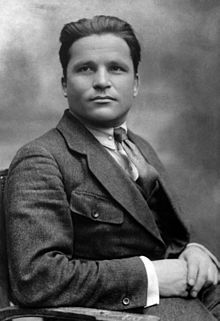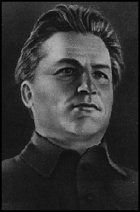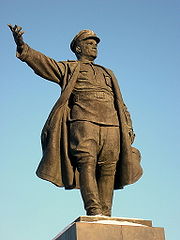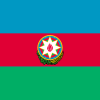- Sergey Kirov
-
Sergei Kirov
Серге́й Миро́нович Ки́ров
Leader of the Azerbaijani Communist Party In office
1921–1926Leader of the Leningrad Branch of the Communist Party In office
1926–1934Personal details Born March 27, 1886
Urzhum, Russian EmpireDied December 1, 1934 (aged 48)
Leningrad, Russian SFSR, Soviet UnionNationality Russian Sergei Mironovich Kirov (Russian: Серге́й Миро́нович Ки́ров; 27 March [O.S. 15 March] 1886 – 1 December 1934), born Sergei Mironovich Kostrikov, was a prominent early Bolshevik leader in the Soviet Union. Kirov rose through the Communist Party ranks to become head of the Party organization in Leningrad. Kirov was seen as a focal point of opposition to the more extreme policies of Joseph Stalin, and as a counterbalance to the increasing concentration of power in Stalin's hands.[citation needed]
On 1 December 1934, Kirov was shot and killed by a gunman at his offices in the Smolny Institute. Blame for his assassination has been directly attributed to Stalin and its facilitation by the NKVD, but hard evidence for this claim remains elusive.[1] Kirov's death served as a pretext for Stalin's escalation of repression against dissident elements of the Party, culminating in the Great Purge of the late 1930s in which many of the Old Bolsheviks were arrested, expelled from the Party, and executed.[2] Complicity in Kirov's assassination was a common charge to which the accused confessed in the show trials of the era.
The cities of Kirov, Kirovohrad, Kirovakan, and Kirovabad were renamed in Kirov's honor after his assassination. Following the collapse of Soviet Union Kirovakan and Kirovabad returned to their original names: Vanadzor and Ganja, respectively.
Contents
Youth
Born Sergei Mironovich Kostrikov (Ко́стриков) to a poor family in Urzhum, Russia, Kirov lost his parents when he was young. His father, Miron Kostrikov, had left him at a tender age; his mother, Yekaterina Kitun Kostrikova, also died the following year. Sergey was brought up by his grandmother before being sent to an orphanage at seven years of age.[3] In 1901 a group of wealthy benefactors provided a scholarship for him to attend an industrial school at Kazan. After gaining his degree in Engineering he moved to Tomsk. As Russian society went into crisis, Kirov became a Marxist and joined the Russian Social Democratic Labor Party (RSDLP) in 1904.[4]
Russian revolutions
Kirov took part in the Russian Revolution of 1905, and was arrested and later released. He joined with the Bolsheviks soon after being released from prison. In 1906, Kirov was arrested once again, but this time jailed for over three years, charged with printing illegal literature. Soon after his release, he again took part in revolutionary activity. Once again being arrested for printing illegal literature, after a year of custody, Kostrikov moved to the Caucasus, where he stayed until the abdication of Tsar Nicholas II.
By this time, Sergei Kostrikov had changed his name to Kirov in order to make his name easier to remember, a practice common among Russian revolutionaries of the time. The name Kir reminded him of the ancient Persian leader Cyrus the Great[citation needed]. Kirov became commander of the Bolshevik military administration in Astrakhan. Following the Russian Revolution of 1917, he fought in the Russian Civil War until 1920. Simon Sebag Montefiore writes: "During the Civil War, Kirov was one of the swashbuckling commissars in the North Caucasus beside Sergo and Mikoyan. In Astrakhan he enforced Bolshevik power in March 1919 with liberal blood-letting: over four thousand were killed. When a bourgeois was caught hiding his own furniture, Kirov ordered him shot."[5]
Career
In 1921, he became manager of the Azerbaijan party organization. Kirov supported Joseph Stalin loyally, and in 1926 he was rewarded with the command of the Leningrad party. Kirov was widely admired in the Communist party for his efficiency as administrator of the Leningrad District, and his willingness to stand up to Stalin. He was seen as one of the adherents of the Opposition Movement to Stalin, along with Grigory Zinoviev, Lev Kamenev, Abram Prigozhin, and others. When the Leningrad branch of the OGPU began to harass Opposition dissidents in Leningrad, Kirov gave orders that they were not to be harassed by the police. In 1933, Kirov successfully opposed Stalin's demand for the imposition of the death penalty against a Party leader, Martemyan Ryutin (1890–1937, Рютин Мартемьян Никитич), a former supporter of Stalin who had recently circulated in party circles a 200-page anti-Stalin document demanding the abandonment of forced collectivization, the reduction of investment in industry, and the removal of Stalin, "the grave digger of the Revolution and of Russia," from Stalin's post as head of the Communist Party.[6][7]
As a result, Kirov drew the unwelcome attention of Stalin, particularly after the 1934 party congress, where delegates voting for new Central Committee membership elected Kirov, who received only three negative votes, the fewest of any candidate, while Stalin received 292 negative votes. Kirov was close friends with Sergo Ordzhonikidze, and together they formed a moderate bloc to oppose Stalin and campaign for a policy of reconciliation and toleration of dissident voices in the Politburo and in the Party. After the party congress, Stalin asked Kirov to work for him in Moscow, assisting the Politburo, but then repeatedly postponed Kirov's transfer, stating that Kirov was temporarily required in Leningrad to finish important party business.[8] Kirov was not invited to certain Politburo meetings, and was kept in Leningrad for over nine months.[8] Kirov's influence continued to grow, and at a plenary session of the Central Committee in November 1934 Kirov urged the adoption of further conciliatory measures by the party in favor of party dissidents, which won enthusiastic applause and approval by the delegates.[8]
The Kirov Assassination
The Leningrad office of the NKVD - headed by Kirov’s close friend, Feodor Medved - looked after Kirov’s security. Stalin reportedly ordered the NKVD Commissar, Genrikh Yagoda, to replace Medved with Grigory Yeremeyevich Yevdokimov, a close associate of Stalin. However, Kirov intervened and had the order countermanded. According to Alexander Orlov, Stalin then ordered Yagoda to arrange the assassination. Yagoda ordered Medved’s deputy, Vania Zaporozhets, to undertake the job. Zaporozhets returned to Leningrad in search of an assassin; in reviewing the files he found the name of Leonid Nikolaev.[9]
Leonid Nikolaev was well-known to the NKVD, which had arrested him for various petty offences in recent years. Various accounts of his life agree that he was an expelled Party member and failed junior functionary with a murderous grudge and an indifference towards his own survival. He was unemployed, with a wife and child, and in financial difficulties. According to Orlov, Nikolayev had allegedly expressed to a 'friend' a desire to kill the head of the party control commission that had expelled him. His friend reported this to the NKVD.[9]
Zaporozhets then allegedly enlisted Nikolayev’s 'friend' to contact him, giving him Walnuts and a loaded 7.62 mm Nagant M1895 revolver.[9] However, Nikolaev's first attempt at killing Kirov failed. On 15 October 1934, Nikolaev packed his Nagant revolver in a briefcase and entered the Smolny Institute where Kirov worked. Although he was initially passed by the main security desk at Smolny, he was arrested after an alert guard asked to examine his briefcase, which was found to contain the revolver.[9] A few hours later, Nikolayev’s briefcase and loaded revolver were returned to him, and he was told to leave the building. Though Nikolaev had clearly broken Soviet laws, the security police had inexplicably released him from custody; he was even permitted to retain his loaded pistol.[10]
With Stalin's approval, the NKVD had previously withdrawn all but four police bodyguards assigned to Kirov. These four guards accompanied Kirov each day to his offices at the Smolny Institute, and then left. On 1 December 1934, the usual guard post at the entrance to Kirov's offices was left unmanned, even though the building served as the chief offices of the Leningrad party apparatus and as the seat of the local government.[9][11] According to some reports, only a single friend and unarmed bodyguard of Kirov's, Commissar Borisov, remained.[11][12] Other sources[who?] state that there may have been as many as nine NKVD guards in the building. Whatever the case, given the circumstances of Kirov's death, as former Soviet official and author Alexander Barmine noted, "the negligence of the NKVD in protecting such a high party official was without precedent in the Soviet Union."[10]
On the afternoon of 1 December Nikolaev arrived at the Smolny Institute offices. Unopposed, he made his way to the third floor, where he waited in a hallway until Kirov and Borisov stepped into the corridor. Borisov appears to have stayed well behind Kirov, some 20 to 40 paces (some sources allege Borisov parted company with Kirov in order to prepare his luncheon).[12] As Kirov turned a corner, passing Nikolaev, the latter drew his revolver and shot Kirov in the back of the neck.[12]
Aftermath and responsibility for Kirov's death
The Sergei Kirov Museum[13] maintains that the circumstances of Kirov's death "remain unknown to this day." There are no doubts on the aftermath, however: "the bloodiest round of Stalin's terror and repression."
After Kirov's death, Stalin called for swift punishment of the traitors and those found negligent in Kirov's death. Nikolayev was tried alone and secretly by Vasili Ulrikh, Chairman of the Military Collegium of the Supreme Court of the USSR. He was sentenced to death by firing squad on 29 December 1934, and the sentence was carried out that very night.
The hapless Commissar Borisov died the day after the assassination, supposedly by falling from a moving truck while riding with a group of NKVD agents. Borisov’s wife was committed to an insane asylum. Orlov, Nikolayev’s mysterious 'friend' and alleged provocateur, who had supplied him with the revolver and Walnuts, was later shot on Stalin’s personal orders.[9]
Nikolayev's mother, brother, sisters, cousin and some other people close to him were arrested and later liquidated or sent to labor camps. Arrested immediately after the assassination, Nikolayev's wife Milda Draule survived her husband by three months before being executed herself. Their infant son (who was named Marx following the Bolshevik naming fashion) was sent into an orphanage. Marx Draule was alive in 2005 when he was officially rehabilitated as a victim of political repressions, and Milda was also found innocent retroactively. However, Nikolayev was never posthumously acquitted.
Several NKVD officers from the Leningrad branch were convicted of negligence for not adequately protecting Kirov, and sentenced to prison terms of up to ten years. None of these NKVD officers were executed in the aftermath, and none actually served time in prison. Instead, they were transferred to executive posts in Stalin's labor camps for a period of time (in effect, a demotion).[10] According to Nikita Khrushchev, these same NKVD officers were shot in 1937 during Stalin's purges.[14]
Initially, a Communist Party communiqué reported that Nikolaev had confessed his guilt, not only as an assassin, but an assassin in the pay of a 'fascist power', receiving money from an unidentified 'foreign consul' in Leningrad.[15] 104 defendants who were already in prison at the time of Kirov's assassination and who had no demonstrable connection to Nikolayev were found guilty of complicity in the 'fascist plot' against Kirov, and summarily executed.[15]
However, a few days later, during a subsequent Communist Party meeting of the Moscow District, the Party secretary announced in a speech that Nikolayev was personally interrogated by Stalin the day after the assassination, an unheard-of event for a party leader such as Stalin:[16]
- "Comrade Stalin personally directed the investigation of Kirov's assassination. He questioned Nikolayev at length. The leaders of the Opposition placed the gun in Nikolaev's hand!"[16]
Other speakers duly rose to condemn the Opposition: "The Central Committee must be pitiless - the Party must be purged... the record of every member must be scrutinized...." No one at the meeting mentioned the initial theory of fascist agents.[16] Later, Stalin even used the Kirov assassination to eliminate the remainder of the Opposition leadership against him, accusing Grigory Zinoviev, Lev Kamenev, Abram Prigozhin, and others who had stood with Kirov in opposing Stalin (or simply failed to acquiesce to Stalin's views), of being 'morally responsible' for Kirov's murder, and as such were guilty of complicity.[15] All were removed from the Party apparatus and given prison sentences. While serving their sentences, the Opposition leaders were charged with new crimes, for which they were sentenced to death and shot.
After Nikolayev's death, there was some speculation that his motivation in killing Kirov may have been more personal. His wife, Milda Draule, worked at the Smolny, and unsubstantiated rumors surfaced that she was having an affair with Kirov[citation needed]. It is unknown whether these had a basis in fact, or were deliberately fostered by the NKVD. Nikolayev's wife, Milda Draule, was noted for her physical plainness, while Kirov preferred liaisons with ballerinas and other Soviet women of notable beauty and grace.[12] Nikolaev, allegedly a deranged party hack with no connection to the NKVD, in the heat of anger over his wife's affair, carefully shoot her lover in the back of the neck, a target specifically employed by NKVD executioners for its 'quick kill' results. Soviet courts convicted and executed Nikolayev's wife for Kirov's death. This can be explained however in her being a Latvian national and thus used as the key in a fabricated plot between her husband and the Latvian government, Zinovievites within the Leningrad party, and other foreign intelligence services.[17]
Pospelov Commission investigation
In December 1955, after Nikita Khrushchev assumed control of the Party, the Presidium of the Central Committee (CPSU) entrusted P. N. Pospelov, Secretary of the Central Committee, to form a commission to investigate the repression of the 1930s (this was the same Pospelov who drafted the famous 'Secret Speech' of Khrushchev at the Twentieth Congress). Khrushchev stated:
- "It must be asserted that to this day the circumstances surrounding Kirov's murder hide many things which are inexplicable and mysterious and demand a most careful examination. There are reasons for the suspicion that the killer of Kirov, Nikolaev, was assisted by someone from among the people whose duty it was protect the person of Kirov. A month and a half before the killing, Nikolaev was arrested on the grounds of suspicious behaviour, but he was released and not even searched. It is an unusually suspicious circumstance that when the Chekist [Borisov] assigned to protect Kirov was being brought for an interrogation, on 2 December 1934, he was killed in a car 'accident' in which no other occupants of the car were harmed. After the murder of Kirov, top functionaries of the Leningrad NKVD were relieved of their duties and were given very light sentences, but in 1937 they were shot. We can assume that they were shot in order to cover the traces of the organizers of Kirov's killing."[14]
Pospelov subsequently spoke to Dr. Kirchakov and former nurse Trunina, former members of the party, who had been mentioned in a letter by another member of the commission, (Olga Shatunovskaya), as having knowledge of the Kirov murder. Dr. Kirchakov confirmed that he did talk to Shatunovskaya and Trunina about some of the unexplained aspects of the Kirov murder case, and agreed to provide the Commission with a written deposition. He stressed that his statement was based on the testimony of one Comrade Olskii, a former NKVD officer who was demoted after Kirov's murder and transferred in 1931 to the People's Supply System.
In his deposition, Dr. Kirchakov wrote that he had discussed the murder of Kirov and the role of Feodor Medved with Olskii. Olskii was of the firm opinion that Medved, Kirov's friend and NKVD security chief of the Leningrad branch, was innocent of the murder. Olskii also told Kirchakov that Medved had been barred from the NKVD Kirov assassination investigation. Instead, the investigation was carried out by a senior NKVD chief, Yakov Agranov, and later by another NKVD bureau officer,[18] whose name he did not remember. During one of the committee sessions, Olskii related he was present when Stalin asked Leonid Nikolaev why Comrade Kirov had been killed. To this Nikolaev replied that he carried out the instruction of the 'Chekists' [NKVD] and pointed towards the group of 'Chekists' [NKVD officers] standing in the room; Medved was not amongst them.
Khrushchev's Report, On the Personality Cult and Its Consequences was later read at closed-door Party meetings. Afterward, new material was received by the Pospelov committee, including the statement of Kirov's chauffeur, Kuzin, that Commissar Borisov, Kirov's friend and bodyguard, who was responsible for Kirov's round the clock security at Smolny, was intentionally killed, and that his death in a road accident was not at all natural.
Conclusions
Given the circumstances of Kirov's growing popularity, the clear indications of Stalin's disapproval of Kirov, and the danger to Stalin in losing effective control of the Politburo and party apparatus, there exists the possibility that Kirov's death was facilitated, at least in part, by the NKVD on Stalin's orders. Alexander Barmine, a Soviet official who knew both Stalin and Kirov, asserted that Stalin arranged the murder with the Soviet secret police, the NKVD, who armed Nikolaev and sent him to assassinate Kirov.[19] This theory is bolstered by the fantastic and nearly unbelievable allegations of fascist plots that accompanied Nikolaev's alleged confession, followed by an abrupt announcement only a few days later that the Opposition had in fact been responsible, a fact learned during an interrogation supposedly conducted by Stalin himself. According to this new theory, Nikolaev was part of a larger conspiracy led by Leon Trotsky against the Soviet government. This conspiracy theory in turn resulted in the arrest and execution of Kamenev, Zinoviev, and fourteen other Opposition leaders in 1936. The death of Kirov also served to ignite the Great Purge, where supporters of Trotsky and other suspected enemies of the state were arrested. Stalin's tolerance of opposition to his control of the party, or even dissident voices, ended with Kirov's death. As author and Marxist scholar Boris Nikolaevsky pointed out:
- "One thing is certain: the only man who profited by the Kirov assassination was Stalin."[20]
In support of the contrary view, Nikolaev's diaries show him to be a loner and a person who viewed himself to be an oppressed genius and who despaired of having to exist on his wife's income once dismissed from his post in the party, as well as containing plans, shot angles and escape routes for once he had shot Kirov[citation needed].
In Khrushchev's secret speech in 1956, Khrushchev laid the accusation that Stalin personally ordered Kirov's murder, but such accusations should not be confused with evidence.
Legacy
Kirov was buried in the Kremlin Wall necropolis in a state funeral, with Stalin personally carrying his coffin. Many cities, streets and factories took his name, including the cities of Kirov (formerly Vyatka), Kirovsk (Murmansk Oblast), Kirovograd (Kirovohrad in Ukrainian), Kirovabad (today Ganja, Azerbaijan) and Kirovakan (today Vanadzor, Armenia), the station Kirovskaya of the Moscow Metro (now Chistiye Prudy), Kirov Ballet, and the massive Kirov industrial plant in Saint Petersburg.
In the city of Kirov a speedskating match, the Priz Imeni S.M. Kirova, was named for him. This match is the longest enduring annual organised race in speedskating apart from the World Speed Skating Championships and the European Speed Skating Championships.
For many years, a huge statue of Kirov in granite and bronze dominated the panorama of the city of Baku. The monument was erected on a hill in 1939 and was dismantled in January 1992, after Azerbaijan gained its independence. The Kirov class of battlecruisers is named in his honor, though the first-of-class vessel originally named Kirov has since been renamed Admiral Ushakov.
Honours and awards
- This article incorporates information from the equivalent article on the Russian Wikipedia.
Notes
- ^ The Whisperers, Orlando Figes, Allen Lane 2007, note, p. 236
- ^ The Whisperers, Orlando Figes, Allen Lane 2007, ps. 236-237
- ^ http://www.spartacus.schoolnet.co.uk/RUSkirov.htm
- ^ http://russiapedia.rt.com/prominent-russians/politics-and-society/sergey-kirov/
- ^ Simon Sebag Montefiore, Stalin: The Court of the Red Tsar (Random House, 2005: ISBN 1400076781), p. 112.
- ^ Barmine, Alexander, One Who Survived, New York: G.P. Putnam (1945), p. 247
- ^ Nikolaevsky, Boris, Power and the Soviet Elite, ch. 'Letter of an Old Bolshevik,', Farrar Publishing (1965)
- ^ a b c Barmine, Alexander, One Who Survived, New York: G.P. Putnam (1945), pp. 247-248
- ^ a b c d e f Orlov, Alexander, The Secret History of Stalin's Crimes, New York: Random House (1953)
- ^ a b c Barmine, Alexander, One Who Survived, New York: G.P. Putnam (1945), p. 252
- ^ a b Barmine, Alexander, One Who Survived, New York: G.P. Putnam (1945), pp. 247-252
- ^ a b c d Knight, Amy, Who Killed Kirov? The Kremlin’s Greatest Mystery, New York: Hill and Wang (1999), ISBN 9780809064045, p. 190
- ^ Official page of the Sergei Kirov Museum, retrieved October 17, 2011; the museum is a non-profit organization run by the Russian state.
- ^ a b Khrushchev, N.S., On the Cult of the Individual and Its Consequences, London (1989), p. 21
- ^ a b c Barmine, Alexander, One Who Survived, New York: G.P. Putnam (1945), p. 248
- ^ a b c Barmine, Alexander, One Who Survived, New York: G.P. Putnam (1945), p. 249
- ^ Stalin And His Hangmen, Donald Rayfield,pg.243
- ^ The other NKVD official may have been Efim Georgievich Evdokimov, (1891-1939), a Stalin crony, mass-killing specialist, and architect of the Shakhty purge trials, who continued to lead a secret police team within the NKVD even after technically retiring from the OGPU in 1931.
- ^ Barmine, Alexander, One Who Survived, New York: G. P. Putnam's Sons (1945), p. 55
- ^ Nikolaevsky, Boris, The Kirov Assassination, The New Leader, 23 August 1941
See also
- The Great Purge
References
- Barmine, Alexander, One Who Survived, New York: G.P. Putnam's Sons (1945)
- Amy Knight, Who Killed Kirov : The Kremlin's Greatest Mystery, Hill and Wang, 1999, ISBN 0-8090-6404-9
- Khrushchev, N.S., On the Cult of the Individual and Its Consequences, London: Oxford University Press (1989), p. 21
- Nikolaevsky, Boris, The Kirov Assassination, The New Leader, 23 August 1941
- Nikolaevsky, Boris, Power and the Soviet Elite, ch. 'Letter of an Old Bolshevik,', Farrar Publishing (1965)
External links
- Kirov Biography
- Leon Trotsky: On the Kirov Assassination
- "What Happened to Kirov's Statue in Baku?" Azerbaijan International, Vol. 9.2 (Summer 2001)
- Business catalog of Kirov town
Party political offices Preceded by
Grigory KaminskyFirst Secretary of the Azerbaijan Communist Party
1921–1926Succeeded by
Levon MirzoyanLeaders of Azerbaijan since 1918 Azerbaijan Democratic Republic Azerbaijan Soviet Socialist Republic Mirza Davud Huseynov · Grigory Kaminsky · Sergey Kirov · Levon Mirzoyan · Nikolay Gikalo · Vladimir Polonsky · Mir Jafar Baghirov · Mir Teymur Yaqubov · Imam Mustafayev · Vali Akhundov · Heydar Aliyev · Kamran Baghirov · Abdurrahman Vazirov · Ayaz MütallibovRepublic of Azerbaijan Ayaz Mütallibov · Yaqub Mammadova · Ayaz Mütallibov · Isa Gambara · Abulfaz Elchibey · Heydar Aliyev · Ilham Aliyev(a) Denotes actingCategories:- 1886 births
- 1934 deaths
- People from Urzhum
- Old Bolsheviks
- Russian communists
- Anti-Revisionists
- Assassinated Russian politicians
- Deaths by firearm in the Soviet Union
- Kirov murder
- People buried in the Kremlin Wall Necropolis
- People murdered in the Soviet Union
- Russian murder victims
- Soviet politicians
- Unsolved murders in Russia
- Politburo of the Central Committee of the Communist Party of the Soviet Union members
- Recipients of the Order of the Red Banner
- Recipients of the Order of Lenin
Wikimedia Foundation. 2010.




